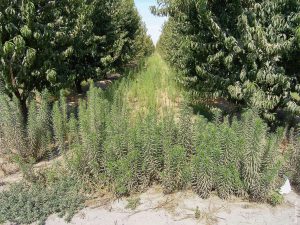By: Brad Hanson, Weed Specialist, UC Davis.
Are you planning on attending the World Ag Expo? As part of a national effort on developing research and regulatory priorities related to the challenging problems of herbicide-resistant weeds, the Weed Science Society of America is sponsoring a half-day regional workshop to discuss the issues, potential solutions, and technical and economic barriers related to resistant weeds.
To date, much of the conversation about herbicide resistance at the national level has been dominated by the large acreage row crops of the Midwest, East, and South. These cropping systems, particularly the glyphosate-based no-till corn, soybean, and cotton production systems have been tremendously affected by resistance. In the West, however, our challenges with (and solutions for) herbicide resistance are likely to be very different than in the rest of the country.

Glyphosate resistant horseweed from Fresno County
California, New Mexico, and Arizona are combining to hold a Southwest US Herbicide Resistance Listening Session on February 15, 2017 in Tulare, California during the World Ag Expo. The format of this workshop will be a facilitated half-day (morning) discussion session and will lead to a more formalized and defined understanding of herbicide resistance at both the regional and national level.
Our goal with the Southwest listening session is to gather a group of people representing the diverse cropping systems, working landscapes, natural ecosystems, as well as the mosaic of urban, suburban and infrastructure areas where weeds are managed. Some of these areas are highly impacted by herbicide resistance while others are virtually unaffected. We’d like to ensure that the challenges of resistant weed in the Western US are represented in the national level conversation so we are seeking participation from a broad spectrum of growers, retailers, consultants and pest control advisors, and other private and public sector weed managers to participate in the discussion.
If you are interested in contributing to this conversation from your perspectives as: growers, commodity leaders, ag suppliers, pest control consultants, local/state/federal land managers, right-of-way managers, etc, please go fill out this survey to provide your contact information and answers to a few simple categorization questions.
In a few weeks, we’ll use this list to invite workshop attendees that balance among the view points, regions, and sectors representing the diversity of Southwestern weed management viewpoints.
Thank you,
Brad Hanson, University of California
Brian Schutte, New Mexico State University


Leave a Reply